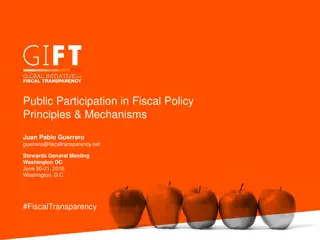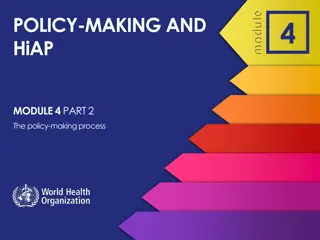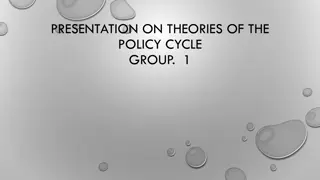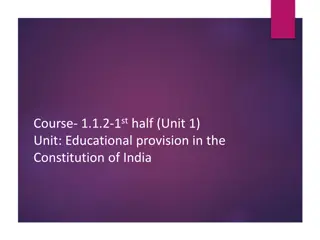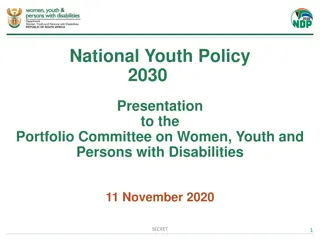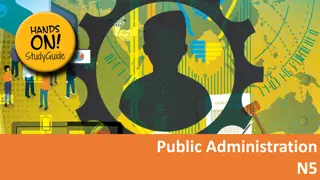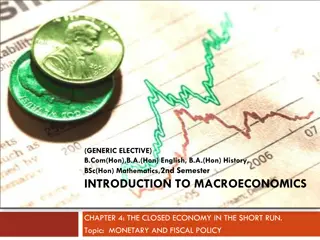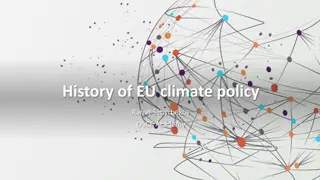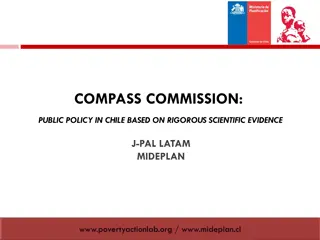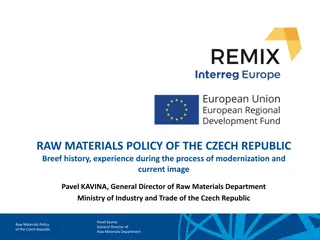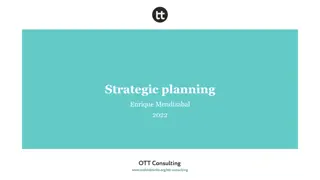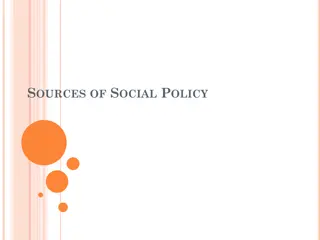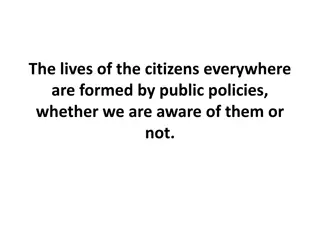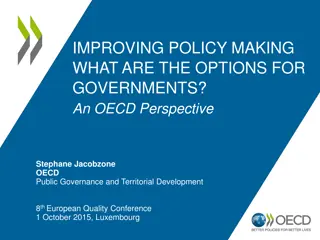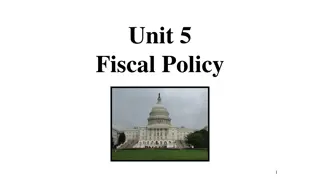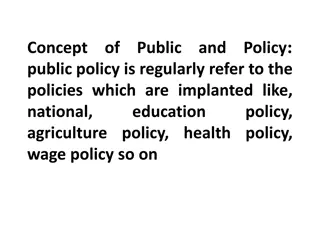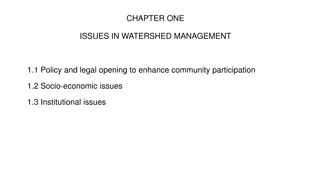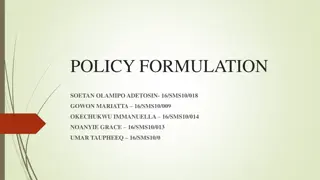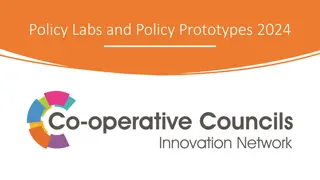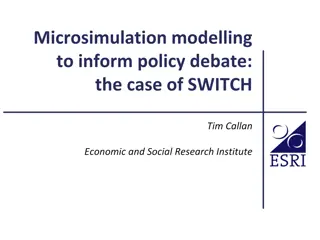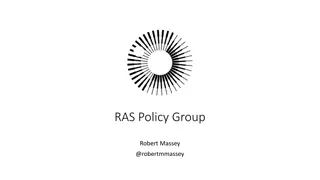Workshop on STI Policy for SDGs and Gender Equality
Approaches to STI policy-making in the context of Sustainable Development Goals (SDGs), with an emphasis on open science and gender equality. It covers the importance of STI in achieving SDGs, interrelationships between goals, building a robust STI system, and the STI policy cycle. Key elements incl
3 views • 15 slides
National Food Processing Policy and Its Importance
National Food Processing Policy aims to address the significant wastage in food production through value addition and efficient processing. The policy highlights the reasons for food processing, including reducing losses in the supply chain and enhancing quality. It emphasizes creating an enabling e
1 views • 19 slides
Decolonising Approach to Policy Impact: Lessons for Research Culture
Engaging with policy in Global South countries and addressing power imbalances and historical complexities is crucial in policy impact and research culture. The Institute for Policy and Engagement at the University of Nottingham focuses on decolonising policies and research practices to promote equi
0 views • 19 slides
Practical Guide to Writing Policy Briefs for Research Engagement with Policy Makers
Effective communication with policy makers is essential for influencing policy decisions. This practical guide offers advice on creating high-quality policy briefs based on research evidence, providing tools and indicators to measure impact.
0 views • 15 slides
Gender Equity and Social Inclusion Policy Overview
This overview highlights the Gender Equity and Social Inclusion (GESI) Policy promoted by the Department of Personnel Management in Papua New Guinea. The policy aims to ensure fair participation of disadvantaged individuals in employment and opportunities, along with social inclusion to realize the
1 views • 18 slides
International Law of War: Nuremberg Principles and Accountability
The Nuremberg Principles, derived from the trials of Nazi officials for war crimes, establish accountability in international law. These principles hold individuals responsible for committing acts considered crimes under international law, regardless of their position or orders received. The assumpt
2 views • 22 slides
Overview of Policy Service Node (PSN) Architecture
The Policy Service Node (PSN) architecture consists of various key components such as Policy Administration Node (PAN), Monitoring Node (MnT), Inline Posture Node (IPN), and Multi-Function Node. These components work together to enable efficient policy management and network monitoring within a netw
1 views • 5 slides
Principles of Public Participation in Fiscal Policy
The work by GIFT focuses on developing principles for public participation in fiscal policy, emphasizing the importance of citizen engagement beyond mere disclosure. These principles aim to enhance accountability, uphold citizens' rights, and improve policy quality through inclusiveness and openness
0 views • 17 slides
Understanding Policy-Making Process for Health Improvement
Policy-making involves defining policy, recognizing its complex nature, identifying windows of opportunity, and framing health issues. The policy-making cycle includes stages like agenda setting, formulation, and implementation. Alignment of problems, policies, and politics is crucial for effective
1 views • 12 slides
Effective Writing and Policy Briefs: Enhancing Impact in Policy-making
A policy brief is a compelling document designed to influence decision-makers by outlining policy alternatives and courses of action. Discover the value of policy briefs, effective characteristics, and strategies for agenda setting and policy formulation in this comprehensive module.
1 views • 22 slides
Understanding Theories of the Policy Cycle in Policy Analysis
The policy cycle theory describes the evolution of policy issues from inception to evaluation, impacting scientific research and policy formulation. It outlines stages from the 1950s, influenced by Lasswell's seven-stage model, serving as a framework for organizing policy processes. Despite the line
3 views • 30 slides
Directive Principles of State Policy in the Indian Constitution
The Directive Principles of State Policy in the Indian Constitution provide guidelines for governance, focusing on social justice, economic welfare, and a just society. These principles are inspired by socialist ideology and aim at ensuring social and economic justice by minimizing inequalities, pro
3 views • 16 slides
National Youth Policy 2030 Presentation to the Portfolio Committee
The National Youth Policy 2030 presentation provides an update on the approved policy, focusing on the youthful population in South Africa and the importance of youth development. The policy aims to address past injustices and current challenges, empowering young people to drive positive change. Pas
1 views • 19 slides
Understanding Public Policy-Making Process in Government
Explore the intricacies of public policy-making in government administration, focusing on the importance of providing equal access to basic services for all citizens. Delve into the nature of public policy, factors influencing policy-making, and the procedural aspects involved, including planning, o
0 views • 36 slides
Macroeconomic Policy Tools: Monetary and Fiscal Policy in Short Run
This chapter delves into the IS-LM model to illustrate the functioning of monetary and fiscal policies in influencing economic growth. It explains how these policies impact output, interest rates, and inflation rates in a closed economy in the short run. Monetary policy mainly operates through open
0 views • 18 slides
Green Industrial Innovation Policy Making in Europe by Reinilde Veugelers
Shifting economies towards green industrial innovation in Europe is a significant transformation that requires reconciling various objectives like decarbonization, economic growth, job creation, and global competitiveness. The role of innovation in green industrial policy is crucial for delivering n
2 views • 13 slides
Challenges in Policy Implementation and Lessons Learned
The content discusses the challenges faced in policy implementation, focusing on the gap between policy design and execution. It highlights key steps in policy-making, reasons for implementation failures, and factors influencing successful policy outcomes. Examples from Zambia's National Science and
1 views • 14 slides
Evolution of EU Climate Policy: A Historical Perspective
The history of EU climate policy can be traced back to the 1970s when concerns about global climate change started gaining policy relevance. The 1980s saw increased awareness and the EU's involvement in environmental matters, leading to the adoption of the Single European Act in 1987. In the early 1
0 views • 18 slides
Unpacking the RIA Process for Effective Policy Implementation
Delve deeper into the RIA process to understand its technical capacity and policy implications. This group exercise focuses on setting clear objectives, analyzing key policy issues, and creating a mock RIA process template tailored to the Indian context. Participants explore real-world problem-solvi
0 views • 14 slides
Compass Commission: Public Policy in Chile Based on Rigorous Scientific Evidence
The Compass Commission, initiated by the Ministry of Planning of Chile in collaboration with J-PAL, aimed to identify social policy challenges in Chile and propose innovative public policies for evaluation through randomized control trials. The initiative involved academic members, international and
0 views • 10 slides
Implementation of Cell Phone Policy to Improve English Grades at Richwoods High School
Implementation of a cell phone policy at Richwoods High School was driven by the need to enhance English grades and academic performance. The policy aims to reduce distractions and disruptions caused by non-academic cell phone use in classrooms. Results from previous semesters showed significant imp
0 views • 9 slides
Raw Materials Policy of the Czech Republic: History, Modernization, and Challenges
The Raw Materials Policy of the Czech Republic has undergone significant changes and challenges throughout its history. From the approval of the previous policy in 1999 to the recent modernization efforts in 2015, political and environmental factors have played a crucial role in shaping the current
0 views • 13 slides
Theories and Strategies for Effective Policy Change
Explore the intricacies of strategic planning, outcome mapping, change theories, policy windows, and more in the realm of policy entrepreneurship and advocacy. Learn about key concepts such as large leaps theory, policy streams theory, and how think tanks can influence policy decision-making process
0 views • 43 slides
Overview of Directive Principles of State Policy in Indian Constitution
Directive Principles of State Policy (DPSP) in the Indian Constitution encompass social, economic, and political programs aimed at realizing ideals of justice, liberty, equality, and fraternity. They are non-justiciable but guide the state in legislative matters. Classified into Socialistic, Gandhia
0 views • 24 slides
Life Insurance Policy Details - How It Works, Plan Specifications, Benefits, and More
This detailed document provides information about a life insurance policy, including premium payment options, sum assured details, policy benefits in case of death, maturity benefits, plan features, waiting periods, and more. It outlines the policy specifications, age limits, premium payment terms,
0 views • 9 slides
Morality in UK Drug Policy: Policy Constellations Analysis
Morality plays a significant role in shaping drug policy in the UK, as revealed by the research conducted by Professor Alex Stevens at the University of Kent. The study investigates the moral commitments underlying different policy positions in UK drug policy debates, highlighting five ethico-politi
0 views • 19 slides
Evolution of Public Policy: From Seeds Sown in 1940s to Academic Discipline in Social Science
The lives of citizens are shaped by public policies, often unnoticed. The analysis of current public policy in America carries a unique 20th-century essence. Beginning in the 1940s, these policy seeds have profoundly influenced government and academic institutions. By the early 1950s, public policy
0 views • 6 slides
Understanding FAIR Principles in Biomedical Research
The FAIR principles - Findable, Accessible, Interoperable, and Reusable - provide a framework for ensuring scientific data in biomedical research is managed and shared effectively. This informative session delves into the theory and practice of FAIR principles, emphasizing the importance of data qua
0 views • 28 slides
Industrial Policy: The Old and The New - Insights by Dani Rodrik
Industrial policy, as presented by Dani Rodrik in May 2019, emphasizes the importance of empirical work, the differences between old and new policies, and the targets industrial policy should focus on. The theoretical arguments for industrial policy highlight market imperfections, learning spillover
0 views • 26 slides
Enhancing Policy Making: Options for Governments - An OECD Perspective
Various tools and approaches are discussed to improve policy making, including foresight, cost-benefit analysis, and regulatory tools. The changing context of policy challenges is highlighted, along with the OECD policy toolkit's modular approach. Strategies like talking to leaders, engaging stakeho
0 views • 20 slides
Updated Petty Cash Policy Guidelines
Updated Petty Cash Policy Guidelines introduced by Andrea Sexton, Associate Director of Policy and Business Process at the University Financial Policy Office in April 2016. The key changes include new recommendations on the use and balances of petty cash accounts, streamlined procedures for account
0 views • 11 slides
Guiding Principles for GETSI/INTEGRATE Webinar – Materials Development and Goals
The webinar presented by David Steer from the University of Akron focuses on guiding principles for material development in the context of GETSI/INTEGRATE modules. It outlines goals for the session, including discussing components of the guiding principles, examples of meeting those principles, and
0 views • 13 slides
Understanding Government Tools for Economic Stability
The government uses fiscal and monetary policies to stabilize the economy. Fiscal policy involves Congress's actions through government spending or taxation changes, while monetary policy is driven by the Federal Reserve Bank. Discretionary fiscal policy involves new bills designed to adjust aggrega
0 views • 36 slides
Understanding Public Policy: Concepts and Notions
Public policy encompasses a wide range of policies implemented by governments, such as national, education, and health policies. It is a collective effort that influences various domains of life and involves governmental involvement in human actions. The concept of public policy reflects the values,
0 views • 6 slides
Issues in Watershed Management: Policy, Legal, and Community Participation
Policy and legal frameworks play a crucial role in enhancing community participation in watershed management. Understanding policy impacts, participatory processes, and implementation strategies are key for effective management planning. Definitions of policy, its components, and what it is not are
0 views • 81 slides
Understanding Policy Formulation: Key Concepts and Approaches
Policy formulation is a crucial step in the policy-making process, involving identifying and crafting policy alternatives to address various issues. This phase requires participants to define policy problems, develop alternatives, and select the most feasible solutions based on criteria such as feas
1 views • 12 slides
Policy Labs and Policy Prototypes 2024: How to Get Involved and Submit Bids
Explore opportunities to contribute to Policy Labs and Policy Prototypes in 2024. Engage in collaborative projects to find innovative policy solutions for local government challenges. Learn how to submit Bids and express your interest in leading or participating in these initiatives.
0 views • 11 slides
Understanding Policy Making Process in Health Systems
Explore the stages of policy making, the role of policy champions, and opportunities for policy change in the health sector. Learn about the National Health Systems Resource Centre in India and its objectives in supporting policy development and implementation. Gain insights into the frameworks, div
0 views • 22 slides
Microsimulation Modelling to Inform Policy Debate: The Case of SWITCH
This presentation discusses the usage of the SWITCH microsimulation model to inform policy debates by simulating the impact of tax and welfare policy reforms on household incomes and work incentives. It covers the areas investigated using SWITCH, selected users of SWITCH research, and the role of SW
0 views • 21 slides
RAS Policy Group Overview and Work Plan
The RAS Policy Group, led by Robert Massey, consists of RAS Fellows with a focus on public affairs in astronomy, space science, and geophysics. The group advises on policy matters, including megaconstellations, and collaborates with key organizations. Their 2020 work plan includes budget considerati
0 views • 4 slides







